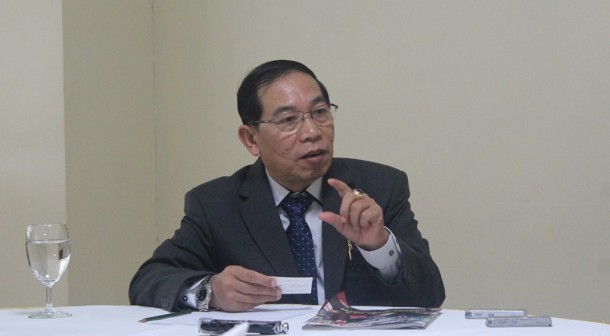In an historic first, Lt-Gen Yawd Serk, the chairman of Restoration Council of Shan State (RCSS), met with President Thein Sein on Monday in the capital Naypyidaw. The meeting marked the first time the ethnic rebel chief and his RCSS have sat down face-to-face with the reformist president, with the two sides still working toward achieving a lasting peace in Burma’s east.
Yawd Serk was in Rangoon on Thursday for continuing peace talks with the government, having held separate meetings with ministers, Shan leaders, civil society groups and the United Nations Office on Drugs and Crime (UNODC) in the days since his Naypyidaw visit.
In an exclusive interview with The Irrawaddy, he shares his views on the peace process and Burma’s political changes, as well as Shan State’s ongoing problems related to narcotics production and trafficking.
Question: Were you satisfied with the results of your meeting with President Thein Sien on Monday?
Answer: We met with the president at the arrangement of the government’s peace committee. We came here to show that we support the peace implementation led by the president. The political doors have been closed for over 60 years. And now President Thein Sein has opened that door and holds talks with every group. Therefore, we are happy [to be part of it].
Q: You have discussed policies [the formation of a monitoring team, troop repositioning and Internally Displaced Persons (IDPs) issues] in your meeting with the president. In practical terms, how would you implement the results of these discussions?
A: We still need to discuss in detail the implementation. We will have to discuss step by step with every sector.
Q: In terms of regional development, the government said this week that it will help with agricultural issues, specifically opium crop substitution. What is your role on that issue?
A: We have a two-part plan for the rehabilitation for local residents. First, we will have to help the opium growers to secure opium substitution crops. Second, we have to prepare the market for the products of these substituted crops.
Q: What is your role in opium eradication in Shan State? How effectively are you able to work toward this goal?
A: RCSS, UNODC and the government’s anti-narcotics bureau have discussed it [opium-eradication] at the roundtable meeting before. Since then, we have not started it yet. We are still in the process of selecting an area for the pilot project.
Q: Monday was your first official trip to the capital. What are your thoughts on Burma’s much-touted political changes?
A: We have not seen yet that our country has changed. But we have seen the approach to achieve those changes.
Q: You gave a Buddha stupa and a traditional Shan outfit to Thein Sein. What was the inspiration for providing those gifts?
A: We chose these gifts because we are Buddhists, and the Buddha teaches us to have compassion. So we intend to have compassion toward each other.
Q: You have had a ceasefire with the government for more than a year, but fighting has continued. What effect does this fighting have on the peace process? And what would you like to say to the Tatmadaw [Burma’s military] regarding this issue?
A: We have been at civil war for six decades. Our people have faced great difficulties, our politics is behind and it’s falling. The country has been on the list of least-developed countries for a long time. Now the peace talks have been created, where we can find a way to solve [these problems]. But, it is difficult to immediately cease the fire, as fighting has taken place for over 60 years. So we will have to discuss it. We need to continue our discussions so that the peace will last.
Q: What is your view on the ethnic Wa calling for an autonomous state? Because, like the Wa, other ethnic groups in Shan State could raise the same demand in the future.
A: It is their [the Wa’s] right to ask for an autonomous state, but it is totally dependent on the public desire as to whether they will be given a Wa State.
Q: Your RCSS was forced in the past to form a Border Guard Force under the central government’s authority as a solution to Shan State’s ethnic conflict. What would you do if you were asked to do so again?
A: No armed group wants to be forced to form a border guard force or asked to disarm. It is not an acceptable condition. And at this time it is not the right atmosphere to ask that [of RCSS] either. We just need to build a federal state instead of that.
















